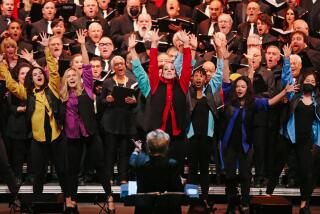Music Reviews : Chanticleer Performs at Marsee Auditorium
- Share via
Chanticleer claims its rare status as a full-time professional vocal group with obvious pride, and its well-honed virtues were much in evidence Tuesday evening at Marsee Auditorium, El Camino College.
But the short, light program also suggested that there may be a downside to that position. Some of the veteran voices sounded frayed--particularly the buzzing, high-pressure countertenor of music director Joseph Jennings--and there were only fleeting intimations of spontaneity in the polished music making.
Most of the repertory here was pop-based, although some of it was very old pop. The set of German Renaissance part songs, for example, included Senfl’s Bavarian bell novelty “Das Glaut zu Speyer” and Isaac’s “Innsbruck, ich muss dich lassen,” delivered with characteristic clarity and affection.
The warmest singing came in more recent ballad settings, most notably “The Sally Gardens,” “L’Amour de Moy” and Steven Sametz’s rapt “I Have Had Singing,” which could be Chanticleer’s theme song. The dozen men attend to text in all languages with point and conviction, and seem to relish the expressive potential of a fragile pianissimo barely held together by sonic surface tension.
They also sing with precision and clean linear definition in all repertory, and adapt their vocal production--Jennings’ unvaried bleat aside--to the period of the music. Their stylistic authority was appreciated in three verses from Monteverdi’s mannerist threnody “Lagrime d’amante,” a tricky work in many ways.
Less convincing was one of Perotin’s “Benedicamus Domino” settings. The Marsee acoustic offers no impediment to textural transparency, but it does little to add flattering reverberance, and Chanticleer sounded mechanical and dry in its opening piece.
Alan Shearer is a composer much appreciated by choral groups for his imaginative setting of distinctive texts, and Chanticleer did well by his “Mushrooms,” a funny, virtuosic exposition of a Sylvia Plath poem. The group members’ versatility is such that they could then return with a confident and expressive performance of Josquin’s “Berzerette savoyenne.”
The later portion of the program found Chanticleer in pure pop territory. The singing had endless elegance and control, but in music where refinement is not the primary requisite. These pieces included Jennings’ deft arrangements of the gospel “Packing Up”--featuring a frenetic Jennings solo--Bill Evans’ “Journey to Recife,” Sondheim’s “Send in the Clowns” and Sametz’s ebullient adaptation of “Boogie Woogie Bugle Boy.”
More to Read
The biggest entertainment stories
Get our big stories about Hollywood, film, television, music, arts, culture and more right in your inbox as soon as they publish.
You may occasionally receive promotional content from the Los Angeles Times.










